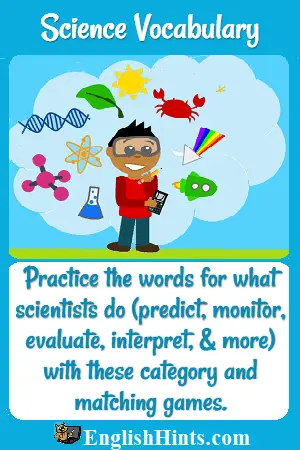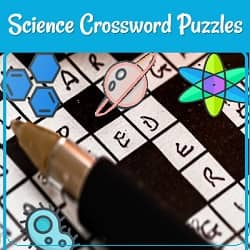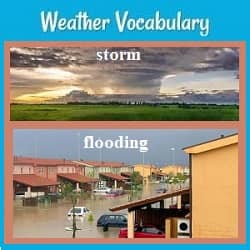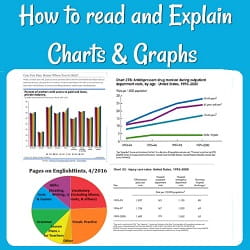Some Important Science Vocabulary
How much of this science vocabulary do you know? Find out with these category and matching games.
These new and review words, mostly from the Academic Word List, explain what scientists do. (If you would like to print this and work offline, click here to download this page and the next as a pdf.)
Scientific Method Vocabulary has explanations and examples for many of these words.
For key words from individual sciences, see the links under Vocabulary for Specific Sciences.
Put this Science Vocabulary into Categories:
- assess,
- assessment,
- erroneous,
- evaluate,
- evaluation,
- hypothesis,
- interpret,
- interpretation,
- invalid,
- irrelevant,
- monitor,
- predict,
- prediction,
- random,
- relevant,
- reliable,
- reproducible,
- significant,
- unreliable,
- valid
Categories
1. Verbs for aspects of the thinking process :
2. Products or outcomes of thinking:
3. Adjectives describing the validity of data. Data can be:
(See the bottom of the page for the answers.)
Match these Science Words with their Meanings :
Instructions: match the meanings on the left with the science vocabulary on the right. Several words are related-- a verb and noun from the same family. So choose the verb if the definition starts with "to ___." Choose a noun if it asks for a thing (a or an _____.) The first one is done as an example.
When you have finished matching, click "check" to see how many you knew.
Note: the matching still works, but the checking function is broken. Until I can det it fixed (if possible), I've added the answers below the Category Answers.
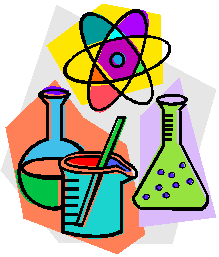
A few explanations for words with more than one use:
Function and monitor can both be used as nouns as well as the verbs given above. Function can mean use or purpose. (It also has a specialized mathematical meaning.)
A monitor is a machine that measures or 'watches' what's happening. A baby monitor carries the sounds the baby makes to his/her parents in another room. A computer monitor is the part of a desktop computer that you look at-- the screen and frame.
Formula sometimes means a pattern of words always used together.
Category Answers
1. Verbs for aspects of the thinking process:
assess, evaluate, interpret, monitor, predict
2. Products or outcomes of thinking:
assessment, evaluation, hypothesis, interpretation, prediction
3. Words describing the validity of data. Data can be:
erroneous, invalid, irrelevant, random, relevant, reliable, reproducible, significant, unreliable, valid
Matching Quiz Answers
(1.) a symbolic expression of a rule or a chemical combination: formula
2. to estimate or determine the value of something: assess
3. a rule or a way of controlling something: regulation
4. to work as intended; to be able to do a job: function
5. to guess (or a guess about) the approximate amount of something: estimate
6. a statement about future expectations: prediction
7. to state that two things are equal or very similar: equate
8. to watch closely: monitor
9. to control: regulate
10. an area within a larger unit: region
11. valuation: assessment
12. to say or guess what will happen in the future: predict
13. mathematical statement that two expressions are equal: equation
14. a mistake: error
More Ways to Practice This Vocabulary
See Science Words Sentence Fill-ins for sentences to practice the science vocabulary above. (It was originally part of this page, but it made the page too long.)
I moved some of the original matching practice to Scientific Method Vocabulary. It also explains many of these words and has an essay on the scientific method.
Still want more practice? Take a Science Words Quiz (a pdf) or a longer, interactive Research and Scientific Words Quiz.
Vocabulary for Specific Sciences
Here's a quick review of the names and subjects of the main scientific disciplines.
- Chemistry studies the building blocks of matter and chemical reactions.
- Physics studies the basic laws of matter and energy.
- Astronomy studies the universe, stars, and planets.
- Geology studies the earth and its composition.
- Meteorology studies the weather and climate.
- Biology studies life and the way living organisms function and interact.
Some of the biological sciences include
- genetics,
- botany (the study of plants),
- zoology (the study of animals),
- anatomy and physiology (the structures of our bodies and the way they function),
- and ecology (the way living things interact with each other and their environment).
Words for Health, illness, and Types of Germs has health-related science vocabulary and practice.
You can learn more about physics, chemistry, biology, and the other sciences in the Science section of Thought Company. They also give the specialized vocabulary you need for each. It's fascinating!
More Related Pages
Try these science crossword puzzles to practice basic science vocabulary while having fun!
Learn & practice important weather vocabulary and concepts.
Examples & explanations of different kinds of charts and graphs, plus the most important vocabulary you need to discuss them yourself.
Home> Online Vocabulary Games in English> Science Vocabulary.
Didn't find what you
needed? Explain what you want in the search box below.
(For example, cognates, past tense practice, or 'get along with.') Click to see the related pages on EnglishHints.
| site search by freefind | advanced |
